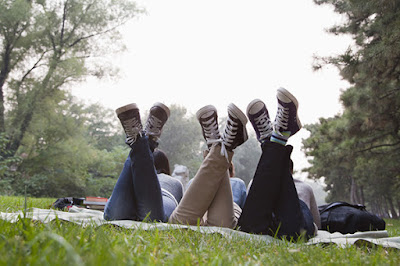After eight years of being sheltered in one-room, one-teacher mode of primary school and familiar friends children in sixth class will be thrust into a timetabled world of multiple teachers, classrooms and subjects, and a whole new group of peers.
These children were sixth class, governing over the younger children; now they will be at the bottom of the heap, conspicuous in their brand new, over-sized uniforms bought with an eye for "room to grow".
Apprehension as well as excitement is natural – not only for the first-year pupils but also their parents. If it's your first child to make this leap in the education system, you may have that "newbie" feeling too.
This can be a difficult yet exciting stage in a young person's life, with adequate communication skills and coping mechanisms the journey need not be so difficult. We have developed the Transition Buddy programme for sixth class students to allow them move along from the safety of their primary school to their new adventure to secondary.
Challenges
Worrying about how your child will cope with all the challenges of secondary school may be coupled with uncertainty about your own role as a parent in these changed circumstances. Parents report the adjustment of having less involvement in their child's day to day routine and less knowledge of their children's new friends as an adjustment they have to make too. This time also coincides with the rite of passage that is teenage discos, which brings a whole new level of peer pressure they may have not experienced before.
How do you strike a balance between under- and over-involvement, between providing support and being a suffocating "helicopter" parent?
The pre-teen is faced with a wide array of new subjects, with the pressure of having to make decisions about which ones to choose at the end of the year. Having to absorb all these new changes and information can be overwhelming.
Research shows that, in the hiatus caused by the move from primary to secondary school, "a high proportion of kids suffer educational progress deficit – something about the transfer from one set of educational parameters to another causes them to dip in their educational attainment.
Most schools are doing much more these days to smooth the way for first-year pupils, with induction programmes, mentoring by older students and bringing them in for a day before the rest of the school's pupils return. Before the end of June, the schools should have received the now compulsory "Education Passport" for each from his or her primary school.
Our Transition Buddy Programme
It's All About Friends!
While friendships can occasionally be difficult, pre-teens need friends, and having friends will help them deal with all the challenges associated with secondary school. Below are some common friendship problems your child might encounter, along with a few simple solutions to help solve them.
Being Excluded: For many pre-teens, their biggest fear is being socially excluded or ostracized from friends and peers. They desire to be a part of a group, and without one, they feel lost. To make matters even more complicated, many pre-tween experience friendship problems in school, and may actually lose a friend or two in the process, even long-term friendships may suffer.
Dealing with Bullying: We educate your child about bullying, and give him or her ideas on how to handle a bully should he or she come face to face with one. We discuss that good friends don't bully, or try to manipulate others. Good friends also don't torment their friends. Helping pre-teens know the difference between a good friend and a bad one is important information they will need throughout adolescence.
Being Dumped: Rejection is never easy, even for adults and it's especially difficult for pre-teens and teens. Sometimes children are rejected, even by long-time friends, or dumped in favour of more popular kids It's also possible for friends to grow apart during school, as interests change or develop. We discuss that sometimes friendships don't last, and point out friends that are still there for him or her.
Positive Mental Well Being
Children are extraordinarily observant, and as they move outward into the world they want to take responsibility for their own wellbeing and that of other people, the environment and so on.
Through discussion and role-play we introduce the idea that a real hero has self-awareness, can understand their own feelings and cultivate positive habits of thought, cares for their own mental health, knows their own limitations and strengths and develops skills to match, asks friends how they are doing, and knows how to listen well.
This Transition Buddy programme gives the young person the tools for personal and social resilience, and invites children to become members of our Hero Club, ambassadors for friendship and self-fulfilment as they move towards adolescence.
Some of the topics we cover are:
- Understanding Feelings
- Know Yourself
- Body Scan
- Move Your Mood
- Take Care of Yourself
- Be Yourself
Young people can learn in times of distress, that they are able to find comfort and support through each other rather than feeling upset and worried. It's these small changes, spread across classrooms, that could make society more kind—and educate a new generation of more compassionate and connected adults.
To book us to come to your school to deliver the Transition Buddy programme to your sixth class email us on hello@buddybench.ie or call (056) 7702027
The feedback from our programmes is very promising – we are currently completing an evaluation with the Mental Health Social Research Unit at NUI Maynooth. According to teachers' ratings, children show more empathy and kindness and a greater ability to calm themselves down when they feel upset. Their social and emotional development has improved, the children showed improvement in the ability to think flexibly, and had cultivated the life skills that have been linked to health and success in later life.



No comments:
Post a Comment